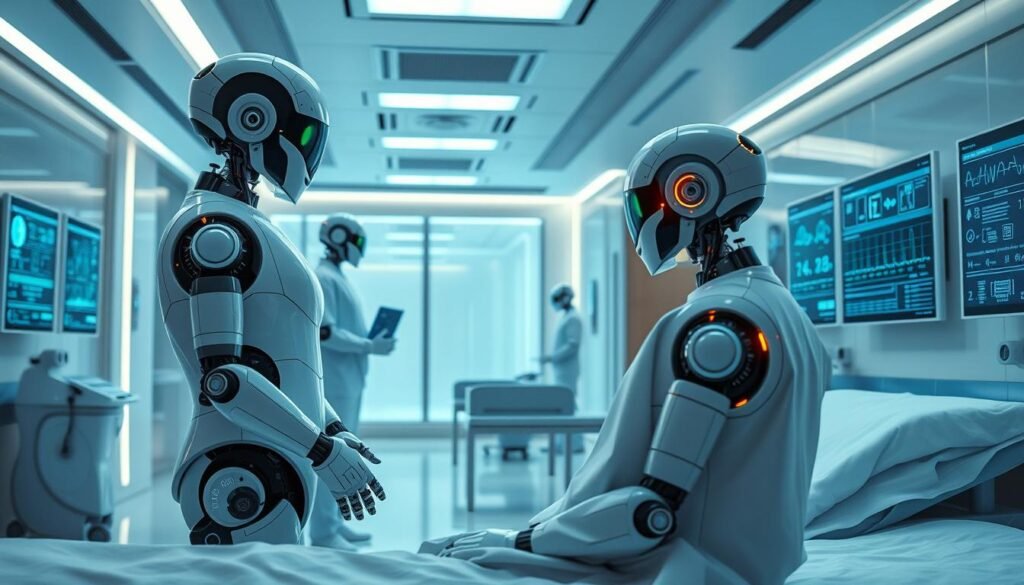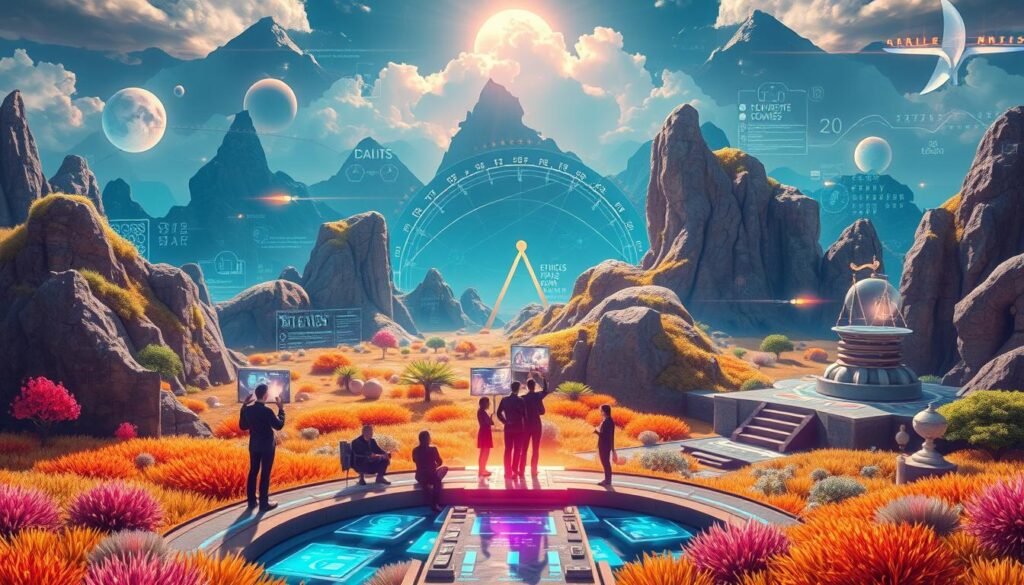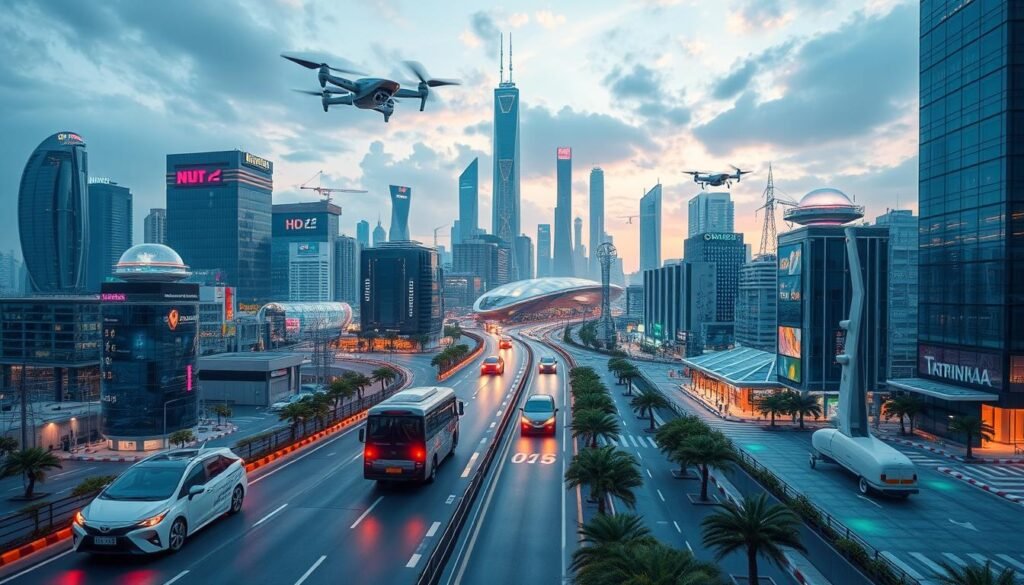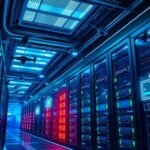Are you ready for the biggest tech leap of the decade? Artificial intelligence could change every industry, making science fiction real.
The future of AI is here, not just coming. PwC says AI will add $15.7 trillion to the world’s economy by 2030. This will change many sectors in big ways.
In 2025, AI will change how businesses work. McKinsey says 71% of people want experiences tailored just for them. Companies that do this well make 40% more money than others.
AI is getting better fast, with things like quantum computing and generative video AI. Healthcare and finance are getting ready for big changes. These changes will make things more efficient and better for customers.
Key Takeaways
- AI expected to contribute $15.7 trillion to global economic output by 2030
- 71% of users demand personalized business experiences
- Quantum AI technology accelerating advancements in multiple fields
- AI-powered cybersecurity market projected to reach $135 billion by 2030
- Generative AI transforming content creation and marketing strategies
Understanding the AI Revolution in 2025
The world of artificial intelligence is changing fast, pushing what’s possible with technology. AI is changing how we use digital systems, opening new doors in many fields.
Today’s machine learning is a complex mix of smart technologies working together. They’re tackling big challenges. Breakthroughs in neural networks are set to change how we use technology.
Emerging AI Capabilities
- Enhanced multimodal processing integrating text, image, and audio
- Development of large AI models with unprecedented parameter complexity
- Miniaturized AI solutions for specialized tasks
Key Drivers of AI Innovation
Several key factors are driving AI forward:
- Advanced hardware capabilities
- Sustainable AI development frameworks
- Increased human-AI collaboration models
“AI in 2025 represents a paradigm shift in technological capabilities, promising to solve complex global challenges.” – AI Research Consortium
Global Industry Impact
| Industry | AI Transformation Areas |
|---|---|
| Healthcare | Personalized diagnostics, remote monitoring |
| Finance | Risk management, automated trading |
| Education | Adaptive learning platforms |
The AI revolution is more than just new tech. It’s about creating smart systems that can learn and work with us in new ways.
AI Innovations 2025, Artificial Intelligence Trends, AI Industry Applications
The AI revolution is changing industries fast. By 2025, we’ll see big tech leaps. Companies are using AI to stay ahead in many fields.
“Nearly 75% of business leaders recognize AI’s transformative power in driving innovation,” says Google Cloud’s latest study.
AI is making a big impact in key areas:
- Healthcare: AI is changing how we diagnose and treat patients.
- Financial Services: AI helps manage risks and spot fraud.
- Retail: AI makes shopping more personal and efficient.
- Manufacturing: AI improves maintenance and automates tasks.
AI is also key in cybersecurity. Companies are getting ready for new tech challenges. They’re working on ways to fight off threats like data poisoning and social engineering.
More companies are using generative AI, with about 70% of Fortune 500 firms using AI for everyday tasks. They’re moving from just exploring AI to using it in a strategic way that helps their business goals.
“Companies not using AI will fall behind in the fast-changing tech world,” warns Google Cloud’s detailed study.
As we get closer to 2025, businesses need to jump on AI to stay competitive and make real changes in their operations.
Breakthrough Developments in Multimodal AI
The world of artificial intelligence is changing fast. Multimodal AI is leading this change in 2025. It uses natural language processing, computer vision, and deep learning to make systems smarter and more flexible.
Multimodal AI is a big step up for machines. They can now understand and interact with complex information like humans do. This is because they can handle different types of data at once.
Integration of Text, Image, and Audio Processing
The coolest thing about multimodal AI is how it combines different data types. It can do things like:
- Sentiment Analysis across text and vocal communication
- Emotion Detection using facial and vocal cues
- Comprehensive Speech Recognition
Advanced Natural Language Understanding
Deep learning is changing how AI gets what we mean. It’s now better at understanding context and nuance in our words. This means AI can:
- Understand language in a more complex way
- Get the context behind what we say
- Talk to us in a more human-like way
Real-time Data Analysis Capabilities
Multimodal AI can now process data from different sources at the same time. It can do things like:
| Data Type | Processing Capability |
|---|---|
| Text | Instant semantic analysis |
| Audio | Real-time emotion recognition |
| Visual | Immediate gesture and expression interpretation |
“Multimodal AI is not just about processing data, but understanding the connections between different forms of communication.” – AI Research Institute
As we look ahead, these technologies will keep changing how we work and live. They will make AI systems that can understand us better than ever before.
AI-Powered Healthcare Transformation
In 2025, AI is changing patient care and making healthcare work better. It uses predictive analytics and AI solutions to help doctors diagnose and treat patients.

Healthcare groups are now using AI that really works. They’re using new tech to make big improvements in many areas:
- Automated administrative processes
- Precision diagnostics
- Personalized treatment plans
- Continuous patient monitoring
“AI is not replacing healthcare professionals but empowering them with unprecedented insights and capabilities.”
AI is making a big difference in several important areas:
- Diagnostic Accuracy: Companies like Tempus use AI to analyze data quickly, helping find diseases faster.
- Drug Discovery: Insilico Medicine uses AI to find new drugs fast, speeding up research.
- Surgical Precision: Intuitive Surgical’s AI robots help surgeons do complex surgeries more accurately.
| Healthcare AI Application | Key Benefits |
|---|---|
| Telemedicine | Enhanced virtual care with automated symptom checking |
| Wearable Monitoring | Continuous health tracking and predictive risk assessment |
| Mental Health Support | AI-powered virtual therapy and personalized interventions |
As healthcare keeps changing, AI will be key in better patient care, saving money, and making healthcare more personal and efficient.
Revolutionary Changes in Financial Services Through AI
The financial world is changing fast thanks to artificial intelligence. By 2025, AI will change how banks work, making them smarter and more personal. This change is huge.
Banks are using AI to change their core work. With 77% of bankers thinking AI is key to success, the tech is spreading fast.
AI-Driven Risk Management Systems
AI is now key in keeping banks safe. Banks use AI to:
- Spot fraud fast
- Look at complex deals
- Lower risks with great accuracy
“AI-powered systems have reported a 149% increase in fraud prevention, transforming financial security strategies.”
Automated Trading Algorithms
AI is changing how trades are made. These smart systems can:
- Quickly sort through huge data
- Make fast trade choices
- Improve investment plans
Personalized Banking Solutions
Banks are now giving hyper-personalized banking experiences. AI helps banks know what each customer needs. This means better advice and product picks.
By 2025, AI in finance will keep pushing the limits. Banking will be more open, safe, and focused on customers than ever.
Manufacturing and Industrial Automation Advances
The manufacturing world in 2025 is changing fast. Robotics and AI are leading this change. They are making production more efficient and precise.
Some big AI advancements in manufacturing include:
- Advanced predictive maintenance systems
- Real-time supply chain optimization
- Intelligent quality control mechanisms
- AI-powered digital twin simulations
“Artificial intelligence is not just changing manufacturing—it’s reimagining what’s possible in industrial production.” – Manufacturing Technology Insights
AI is making a big difference in manufacturing. It lets robots do more complex tasks. This cuts down on mistakes and boosts work speed.
Companies are using AI to make their factories more flexible. They can quickly adjust to new market needs.
| AI Technology | Manufacturing Impact |
|---|---|
| Machine Learning | Predictive Maintenance |
| Computer Vision | Quality Control |
| IoT Integration | Real-time Monitoring |
As companies adopt these new technologies, they face a challenge. One in five Americans is set to retire by 2030. They need to use AI to fill skill gaps and keep operations running smoothly.
The future of making things is about working smarter, not harder. It’s about using technology to help people do their jobs better.
The Rise of AI Agents and Autonomous Systems
The world of artificial intelligence is changing fast. AI agents and autonomous systems are leading this change. They promise to change how we use intelligent machines.
AI agents are a big step forward in computer smarts. By 2025, more companies will use these advanced systems. Deloitte says 25% of businesses will add them to their work.
Self-learning AI Capabilities
Today’s AI agents can learn on their own. They can:
- Adjust to new situations quickly
- Get better with each learning session
- Understand complex data with high accuracy
Human-AI Collaboration Frameworks
The future of AI is working together with humans. New ways are being made to mix human skills with AI. Microsoft and NVIDIA are leading in making tools that help us work better.
Decision-making Algorithms
Autonomous systems are getting smarter at making choices. They now think about ethics and handle complex problems. They’re changing how we make big decisions in fields like healthcare and supply chains.
“AI agents are not just tools, but collaborative partners that extend human capabilities in unprecedented ways.” – AI Innovation Report, 2025
As we look ahead, AI agents and autonomous systems will keep changing industries. They will bring new solutions and chances for growth and better work.
Ethical Considerations and Regulatory Frameworks

AI technologies are changing fast in 2025. The world of AI ethics and governance is also changing a lot. Businesses and governments are now seeing how important it is to have strong ethical AI rules.
“Responsible AI development is no longer optional—it’s a strategic imperative for sustainable innovation.”
The rules for AI are getting better, with big changes happening everywhere. The EU AI Act, passed in March 2024, is a big step. It sets clear rules to stop AI from causing harm.
- Mandatory AI auditing is replacing voluntary compliance
- Transparency and accountability are becoming central priorities
- Intellectual property strategies are adapting to generative AI challenges
Companies are facing tough choices in AI. The mix of fast computers and AI is making big challenges. These include using too much power and designing better systems.
| AI Ethical Consideration | Key Focus Areas |
|---|---|
| Data Privacy | Enhanced user consent mechanisms |
| Algorithmic Bias | Comprehensive bias detection protocols |
| Decision Transparency | Explainable AI models |
The future of AI ethics needs a smart balance. We must keep innovating while looking out for society. Proactive governance will be key in handling AI’s complex ethics.
Conclusion
As we near 2025, AI is changing industries fast. It’s expected to be used in over 70% of businesses. Deloitte says AI could add $15.7 trillion to the global economy by 2030. Your business is changing, with AI at its core, driving growth and innovation.
AI is now in many areas, from healthcare to finance. It’s making tasks easier and helping with big decisions. New AI can handle text, images, and audio at the same time. This makes solutions smarter and more tailored to your business.
AI brings big chances and big challenges. New rules for AI focus on being fair and open. Keeping data safe is key, with new ways to protect against threats. As you move forward with AI, remember to balance new ideas with ethics and careful planning.
AI will keep being a key part of business plans. New tech like quantum computing and predictive analytics will change how we work. Your AI journey is starting, with a future full of efficiency, personalization, and smart insights.



